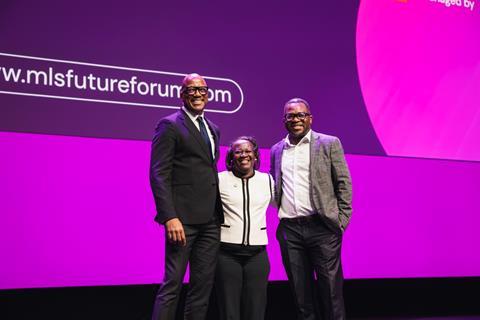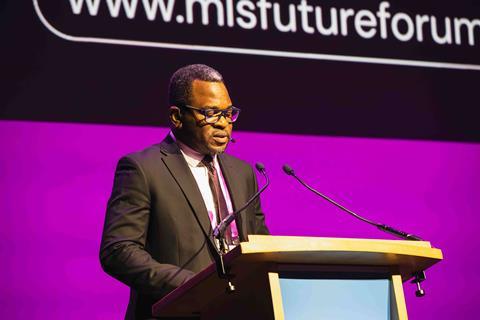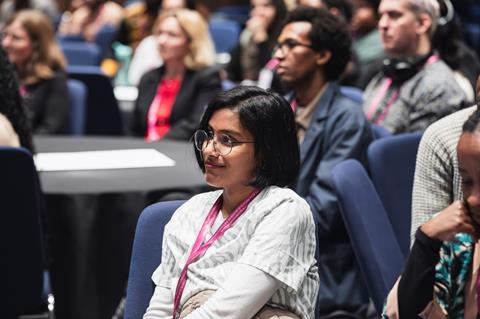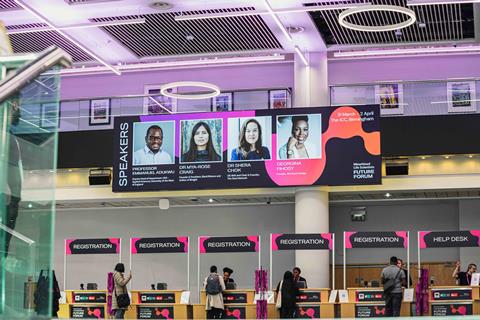More than 500 delegates gathered at the ICC in Birmingham over three days this week for the first ever Minoritised Life Scientists Future Forum, which was supported by Applied Microbiology International.

Hosted by BBC broadcaster Merisha Stevenson, the Future Forum – the first of its kind in Europe - drew more than 125 participating institutions, more than 50 exhibitors, 538 delegates and more than 170 abstract submissions from 12 countries across four continents.
READ MORE: Your voice matters: AMI teams up with the Minoritised Life Scientists Future Forum
READ MORE: Life-changing and unforgettable: Dami and Jisa report back on ABRCMS
The conference brought together like-minded individuals from across the life sciences sector, higher education, and STEM, including metronics, medical robotics and AI technologies, to foster connections, champion equity, diversity, and inclusion, and showcase the incredible talent and richness of the community.
The Future Forum offered the opportunity for delegates to hear from amazing keynote and plenary speakers, including innovators, exceptional trailblazers and thought leaders in education, industry, third sector, in STEM and beyond. It attracted delegates from college through to post graduates with focus and talks on pipeline development and its importance.
Transformational leaders
“You will have the opportunity to listen to scientific presentations from transformational leaders and discuss a wide range of scientific and STEM research during the poster sessions,” MLSFF chairman and AMI Professor Emmanuel Adukwu said as he welcomed delegates.

“For many in the audience today, this conference will raise many important questions, provoke thought and provide insight into the pertinent challenges in the sector – the underrepresentation of women in many STEM subjects in the UK, persistent awarding gaps affecting global majority students, barriers to access and opportunities for individuals with disabilities, the lack of diversity in academia and leadership roles across different sectors, and pay disparities, among other challenges.
“Our uniqueness is that we are truly intentional about building and enabling a diverse pipeline that will empower the life sciences sector for generations to come.”
Underrepresented groups
Multi-award winning disability advocate, speaker and scientist Max Fisher said events like the Future Forum are important for people who belong to underrepresented groups who rarely get to see themselves reflected in their future careers.
“In my session, I chaired a round table focusing on Disability in STEM, and what makes us great. As disabled people we have so many transferable skills that can apply to STEM, yet are overlooked because of differences with our bodies. I was unemployed for 3 and a half years due to my disabilities, and now I work hard to make sure other disabled scientists can see a future where they belong,” they said.
“Furthermore, as a queer person in STEM, it’s important to connect with other like-minded people who can empathise with the unique challenges of being queer in STEM. It’s too often thought that our queer identities should be kept out of the workplace, when in fact we deserve to bring our whole selves to work, like everybody else does.”
Stark statistics
Despite increasing diversity among students entering higher education, Black professors still make up just 0.8% of all professors in the UK, according to the latest figures1. Black academics make up just 2.9% of academics in research-focused roles, with many citing unconscious bias (54%) and unclear promotion pathways (52%) as major barriers to career progression. In addition, 42% of Black early-career academics (ECAs) report not feeling comfortable reporting incidents of bullying or harassment at their institutions.

Beyond the statistics, minoritised scientists frequently report feeling invisible within academia, often missing out on opportunities for collaboration and career progression due to microaggressions and lack of mentoring. For undergraduate students, the lack of visible role models and a clear pathway into academia can make the goal of a research career seem unattainable. The Future Forum aims to address these systemic barriers by providing a platform for visibility, mentorship, and professional growth, helping to bridge the gap between students and established academics.
Challenging journey
Professor Winston Morgan, from the University of East London, said: “The journey from school to university, PhD and then doctoral researcher and into an academic career is extremely challenging, particularly when you are racialized as Black. Climbing the very slippery academic ladder meant I had to force my way through many concrete ceilings, before making it to Professor after 25 years. Reflecting back, there has to be a better way.”
Dr Ukpai Eze, from the University of Chester, said: “Thank you to the MLSFF team for organising this wonderful conference. Such a conference in Europe is long overdue and will provide a safe space for discussion and networking for Minoritised groups. In turn, it will help promote diversity, equity and inclusion in STEM, particularly in the UK.”

Leanne Williams of the University of Warwick, and Academic Lead, LearnSci, said that to build a truly inclusive higher education in STEM, we must move beyond surface-level awareness and engage in a transformative practice that centres equity.
“This begins with an honest reckoning with our own privilege. The language and narratives we employ are not neutral; they shape the learning environment. By openly demonstrating our positionality and leveraging our authority, we can cultivate a culture where knowledge acquisition is accessible and equitable for all,” she said.
Keynote speakers included:
Professor Kevin Fenton, Office for Health Improvement and Disparities (London)
Professor Udak Archibong MBE;
Irene Hulede, Education Director, American Society of Microbiology
Gisela Abbam of the General Pharmaceutical Council
Dr Shera Chok, GP and founder of The Shuri Network
Dr Mya-Rose Craig, founder of Black2Nature
Professor Robert Mokaya, provost and deputy vice chancellor at the University of Sheffield
Professor Leanne Williams, University of Warwick, and Academic lead, LearnSci ,
The first ever Minoritised Life Sciences Future Forum conference (MLSFF) took place from 31st March to 2nd April 2025 at the ICC Birmingham.
To sign up for updates and news about future events, visit the Minoritised Life Scientists Future Forum website: https://mlsfutureforum.com/about/newsletter.html.
Topics
- American Society of Microbiology
- Applied Microbiology International
- Black2Nature
- Community
- Economic Equality
- Emmanuel Adukwu
- General Pharmaceutical Council
- Gisela Abbam
- Irene Hulede
- Kevin Fenton
- Leanne Williams
- LearnSci
- Max Fisher
- Merisha Stevenson
- Minoritised Life Scientists Future Forum
- Mya-Rose Craig
- People News
- Robert Mokaya
- Science Communications
- Science Education & Outreach
- Shera Chok
- The Shuri Network
- UK & Rest of Europe
- Ukpai Eze
- University of Chester
- University of East London
- University of Sheffield
- University of Warwick
- Winston Morgan







No comments yet